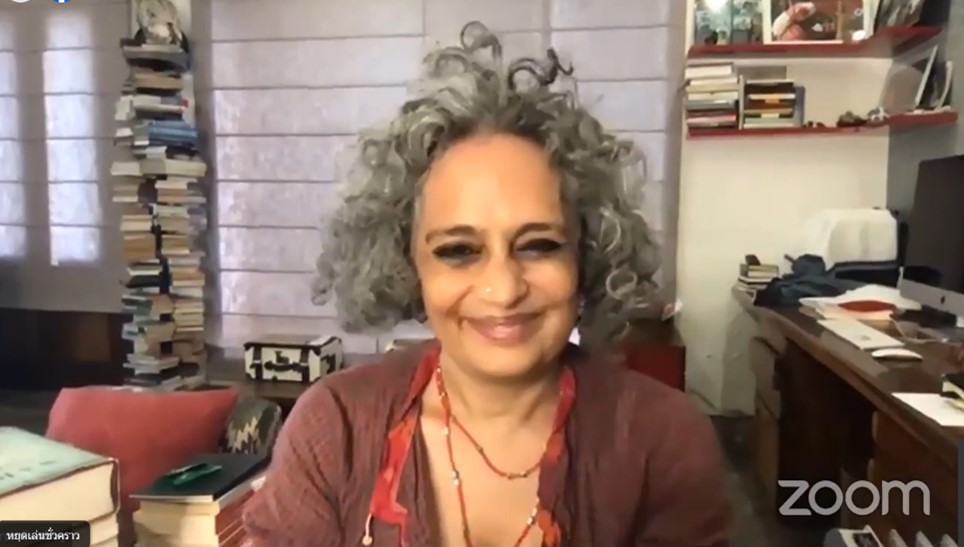Department of English, Chulalongkorn University in Bangkok organised an online reading and discussion titled “The Pandemic, (Necro)Politics and Literature” with Arundhati Roy on 20 February (The link to the discussion).

The event was moderated by Professor Verita Sriratana who was joined by the guest panelists Palin Ansusinha, Judha Su, Chalita Setthachayanon and Pattanun Arunpreechawat. The panel discussed about a wide range of significant subjects, from democracy and dissent to the choice of language in postcolonial writings.
However, the most intriguing aspect of the panel was that it did not only include experts or academics but students who also availed this opportunity to look at Roy’s writing and locate themselves in the context of their socio-political placement in it. Sitting in her home with what seemed like installation art of crowded books behind her, Roy spoke in her usual nonchalant style while playing with her wild hair and discussing about the infinite space of fiction, spectrum of marginalised characters in her work, current state of democracy and climate change.
Much like Roy’s writing (non-fiction, in particular) that has “polis” at the centre stage as she invokes a sense of solidarity among the masses, the panel discussion provided a democratic space for all the participants to make their cases. In “Do Turkeys Enjoy Thanksgiving?”, Roy implores the readers: “When will you stop waiting? When will you say ‘That’s enough!” It’s this personalised approach and subjective appeal of her writings that has made her both a literary darling and an anti-national entity to both her ardent admirers and equally (or even more) zealous detractors. It is this allegiance to “polis” that was maintained during the event as Roy didn’t hijack the panel and allowed for a more inclusive space where all the panelists could participate in an equally significant manner. The discussion succeeded in drawing parallel between the ongoing protests in India and Thailand, their portrayal in popular media and the role of intellectuals in stirring public discourse regarding matters of social importance.
Even though a few attendees expressed their feedback suggesting that Roy should’ve been given more time to talk, the panel succeeded in doing what it aimed to do; first by stirring a discussion and second by building a democratic space in the panel which will innovate this kind of receptiveness and openness in academic and intellectual circles in the public sphere. As a Booker-winner for her debut novel who started writing about the issues that many felt should be left to the experts, Roy challenged the remoteness of conventional academic scholarship that is inaccessible for the common masses back in 1998 (or even earlier when she published reviews of the Bandit Queen).
During this discussion, Roy adopted a similar attitude to streamline the issues that are important and create a space that is easily accessible for the “polis” that is directly affected by these issues. The discussion ended on the right note as Roy read out her desire “to never complicate what is simple, to never simplify what is complicated” to communicate to ordinary people what is happening in the world. And that is what this event rightfully did, thanks to Roy and the fervent panelists.
About the Author: Urvi Sharma is an Assistant Professor working in Mehr Chand Mahajan DAV College for Women, Chandigarh. She is currently pursuing her PhD research on the critical reception of Arundhati Roy’s Writings.


